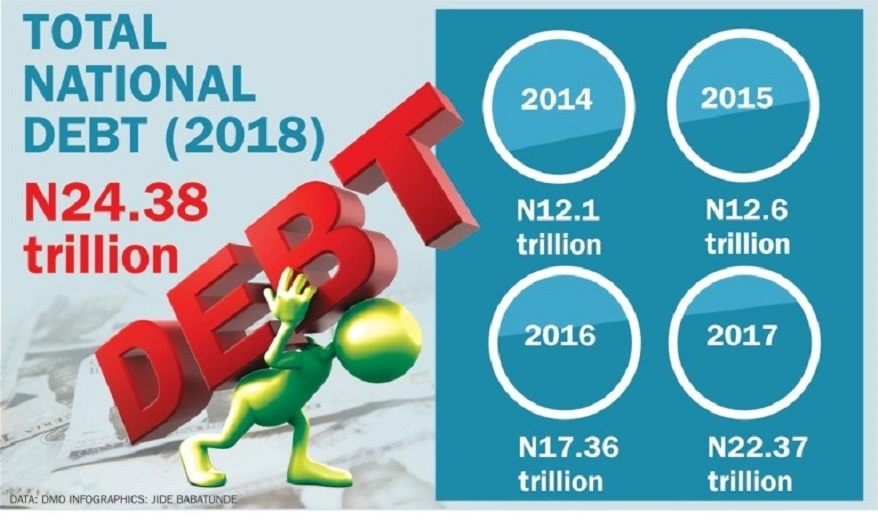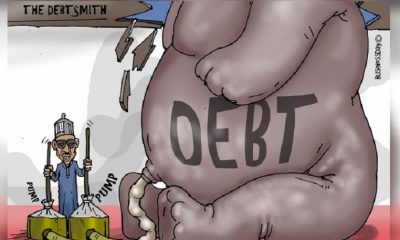Economy
FG, States, FCT Owe N32.9trn as Debt-to-GDP Ratio Hits 21.61%

By Aduragbemi Omiyale
The Debt Management Office (DMO) has said the total debt owed by Nigeria, which includes the federal and state governments as well as the Federal Capital Territory (FCT) stood at N32.9 trillion as at December 31, 2020.
In a statement issued by the agency, it was disclosed that the total debt to Gross Domestic Product (GDP) of the nation in the period under review stood at 21.61 per cent.
According to the DMO, the 21.61 per cent debt-to-GDP is still within Nigeria’s new limit of 40 per cent, noting that the various initiatives of the government to increase revenues such as the Strategic Revenue Growth Initiative and the Finance Act 2020 should help shore up the government’s revenue and reduce the debt service to revenue ratio.
According to the statement, the debt would have been lower if not for the COVID-19 pandemic, which affected Nigeria and many countries across the globe.
The debt office said the N4.20 trillion borrowed by the federal government to partly finance the 2020 appropriation act was the highest in recent years.
“Many countries including the advanced countries also increased their level of borrowing as a result of COVID-19,” the agency argued.
“It should be noted though, that apart from the new domestic borrowing of N2.3 trillion, the other new borrowings were concessional loans from the International Monetary Fund (IMF) of $3.34 billion and other multilateral and bilateral lenders.
“This incremental borrowing to part-finance the 2020 budget and the additional issuance of promissory notes to settle some arrears of the Federal Government of Nigeria, contributed to the increase in public debt stock.
“New domestic borrowings by state governments also contributed to the growth in the public debt stock,” the statement disclosed.
The DMO said since Nigeria exited the first recession under the current administration of President Muhammadu Buhari in 2017, the level of new borrowing at the federal level as shown in the annual budgets had been declining as part of the government’s measures to moderate the rate of growth in the public debt stock in order to ensure debt sustainability.
“New borrowing to part-finance budget deficits had declined steadily from N2.36 trillion in 2017 to N2.01 trillion in 2018, N1.61 trillion in 2019 and N1.59 trillion in the first 2020 appropriation act,” the debt office said.
Economy
Adedeji Urges Nigeria to Add More Products to Export Basket

By Adedapo Adesanya
The chairman of the Nigeria Revenue Service (NRS), Mr Zacch Adedeji, has urged the country to broaden its export basket beyond raw materials by embracing ideas, innovation and the production of more value-added and complex products
Mr Adedeji said this during the maiden distinguished personality lecture of the Faculty of Administration, Obafemi Awolowo University (OAU), Ile-Ife, Osun State, on Thursday.
The NRS chairman, in the lecture entitled From Potential to Prosperity: Export-led Economy, revealed that Nigeria experienced stagnation in its export drive over three decades, from 1998 to 2023, and added only six new products to its export basket during that period.
He stressed the need to rethink growth through the lens of complexity by not just producing more of the same stuff, lamenting that Nigeria possesses a high-tech oil sector and a low-productivity informal sector, as well as lacking “the vibrant, labour-absorbing industrial base that serves as a bridge to higher complexity,” he said in a statement by his special adviser on Media, Dare Adekanmbi.
Mr Adedeji urged Nigeria to learn from the world by comparative studies of success and failure, such as Vietnam, Bangladesh, Indonesia, South Africa, and Brazil.
“We are not just looking at numbers in a vacuum; we are looking at the strategic choices made by nations like Vietnam, Indonesia, Bangladesh, Brazil, and South Africa over the same twenty-five-year period. While there are many ways to underperform, the path to success is remarkably consistent: it is defined by a clear strategy to build economic complexity.
“When we put these stories together, the divergence is clear. Vietnam used global trade to build a resilient, complex economy, while the others remained dependent on natural resources or a single low-tech niche.
“There are three big lessons here for us in Nigeria as we think about our roadmap. First, avoiding the resource curse is necessary, but it is not enough. You need a proactive strategy to build productive capabilities,” he stated, adding that for Nigeria, which is at an even earlier stage of development and even less diversified than these nations, the warning is stark.
“Relying solely on our natural endowments isn’t just a path to stagnation; it’s a path to regression. The global economy increasingly rewards knowledge and complexity, not just what you can dig out of the ground. If we want to move from potential to prosperity, we must stop being just a source of raw materials and start being a source of ideas, innovation, and complex products,” the taxman stated.
He added that President Bola Tinubu has already begun the difficult work of rebuilding the economy, building collective knowledge to innovate, produce, and build a resilient economy.
Economy
Nigeria Inaugurates Strategy to Tap into $7.7trn Global Halal Market

By Adedapo Adesanya
President Bola Tinubu on Thursday inaugurated Nigeria’s National Halal Economy Strategy to tap into the $7.7 trillion global halal market and diversify its economy.
President Tinubu, while inaugurating the strategy, called for disciplined, inclusive, and measurable action for the strategy to deliver jobs and shared prosperity across the country.
Represented by Vice-President Kashim Shettima, he described the unveiling of the strategy as a signal of Nigeria’s readiness to join the world in grabbing a huge chunk of the global halal economy already embraced by leading nations.
“As well as to clearly define the nation’s direction within the market, is expected to add an estimated $1.5 billion to the nation’s Gross Domestic Product (GDP) by 2027. It is with this sense of responsibility that I formally unveil the Nigeria National Halal Economy Strategy.
“This document is a declaration of our promise to meet global standards with Nigerian capacity and to convert opportunity into lasting economic value. What follows must be action that is disciplined, inclusive, and measurable, so that this Strategy delivers jobs, exports, and shared prosperity across our nation.
“It is going to be chaired by the supremely competent Minister of Industry, Trade and Investment.”
The president explained that the halal-compliant food exports, developing pharmaceutical and cosmetic value chains would position Nigeria as a halal-friendly tourism destination, and mobilising ethical finance at scale,” by 2030.
“The cumulative efforts “are projected to unlock over twelve billion dollars in economic value.
“While strengthening food security, deepening industrial capacity, and creating opportunities for small-and-medium-sized enterprises across our states,” he added.
Allaying concerns by those linking the halal with religious affiliation, President Tinubu pointed out that the global halal economy had since outgrown parochial interpretations.
“It is no longer defined solely by faith, but by trust, through systems that emphasise quality, traceability, safety, and ethical production. These principles resonate far beyond any single community.
“They speak to consumers, investors, and trading partners who increasingly demand certainty in how goods are produced, financed, and delivered. It is within this broader understanding that Nigeria now positions itself.”
Tinubu said many advanced Western economies had since “recognised the commercial and ethical appeal of the halal economy and have integrated it into their export and quality-assurance systems.”
President Tinubu listed developed countries, including the United Kingdom, France, Germany, the Netherlands, the United States, Canada, Australia, and New Zealand.
“They are currently among the “leading producers, certifiers, and exporters of halal food, pharmaceuticals, cosmetics, and financial products.”
He stated that what these developed nations had experienced is a confirmation of a simple truth, that “the halal economy is a global market framework rooted in standards, safety, and consumer trust, not geography or belief.”
The president explained that the Nigeria national halal economy strategy is the result of careful study and sober reflection.
He added that it was inspired by the commitment of his administration of “to diversify exports, attract foreign direct investment, and create sustainable jobs across the federation.
“It is also the product of deliberate partnership, developed with the Halal Products Development Company, a subsidiary of the Saudi Public Investment Fund.
“And Dar Al Halal Group Nigeria, with technical backing from institutions such as the Islamic Development Bank and the Arab Bank for Economic Development in Africa.”
The Minister of Industry, Trade and Investment, Mrs Jumoke Oduwole, said the inauguration of the strategy was a public-private collaboration that has involved extensive interaction with stakeholders.
Mrs Oduwole, who is the Chairperson, National Halal Strategy Committee, said that the private sector led the charge in ensuring that it is a whole-of-government and whole-of-country intervention.
The minister stressed that what the Halal strategy had done for Nigeria “is to position us among countries that export Halal-certified goods across the world.
The minister said, “We are going to leverage the African Continental Free Trade Area (AfCFTA) to ensure that we export our Halal-friendly goods to the rest of Africa and beyond to any willing markets; participation is voluntary. “
She assured that as the Chairperson, her ministry would deliver on the objectives of the strategy for the prosperity of the nation.
The Chairman of Dar Al-Halal Group Nigeria L.td, Mr Muhammadu Dikko-Ladan, explained that the Halal Product Development Company collaborated with the group in developing the strategy.
“In addition to the strategy, an export programme is underway involving the Ministry of Trade and Investment, through which Nigerian companies can be onboarded into the Saudi Arabian market and beyond.£
Mr Dikko-Ladan described the Strategy as a landmark opportunity for Nigeria, as it creates market access and attracts foreign direct investment.
Economy
UK, Canada, Others Back New Cashew Nut Processing Plant Construction in Ogun

By Adedapo Adesanya
GuarantCo, part of the Private Infrastructure Development Group (PIDG), has provided a 100 per cent guarantee to support a $75 million debt facility for Robust International Pte Ltd (Robust) to construct a new cashew nut processing plant in Ogun State, Nigeria.
GuarantCo, under the PIDG is funded by the United Kingdom, the Netherlands, Switzerland, Australia, Sweden and Canada, mobilises private sector local currency investment for infrastructure projects and supports the development of financial markets in lower-income countries across Africa and Asia.
Nigeria is one of Africa’s largest cashew producers of 300,000 tonnes of raw cashew nuts annually, yet currently less than 10 per cent are processed domestically. Most raw nuts are exported unprocessed to Asian and other countries, forfeiting up to 80 per cent of their potential export value and adding exposure to foreign exchange fluctuations.
According to GuarantCo, this additional plant will more than double Robust’s existing cashew processing capacity from 100 metric tonnes per day to 220 metric tonnes per day to help reduce this structural gap.
The new plant will be of extensive benefit to the local economy, with the procurement of cashew nuts from around 10,000 primarily low-income smallholder farmers.
There is an expected increase in export revenue of up to $335 million and procurement from the local supply chain over the lifetime of the guarantee.
Furthermore, the new plant will incorporate functionality to convert waste by-products into value-added biomass and biofuel inputs to enhance the environmental impact of the transaction.
It is anticipated that up to 900 jobs will be created, with as many as 78 per cent to be held by women. Robust also has a target to gradually increase the share of procurement from women farmers, from 15 per cent to 25 per cent by 2028, as it reaches new regions in Nigeria and extends its ongoing gender-responsive outreach programme for farmers.
Terms of the deal showed that the debt facility was provided by a Symbiotics-arranged bond platform, which in turn issued notes with the benefit of the GuarantCo guarantee. These notes have been subscribed to in full by M&G Investments. The transaction was executed in record time due to the successful replication of two recent transactions in Côte d’Ivoire and Senegal, again in collaboration with M&G Investments and Symbiotics.
Speaking on the development, the British Deputy High Commissioner, Mr Jonny Baxter, said: “The UK is proud to support innovative financing that mobilises private capital into Nigeria’s productive economy through UK-backed institutions such as PIDG. By backing investment into local processing and value addition, this transaction supports jobs, exports and more resilient agricultural supply chains. Complementing this, through the UK-Nigeria Enhanced Trade and Investment Partnerships and the Developing Countries Trading Scheme, the UK is supporting Nigerian businesses to scale exports to the UK and beyond, demonstrating how UK-backed partnerships help firms grow and compete internationally.”
Mr Dave Chalila, Head of Africa and Middle East Investments at GuarantCo, said: “This transaction marks GuarantCo’s third collaboration with M&G Investments and Symbiotics, emphasising our efforts to bring replicability to everything we do so that we accelerate socio-economic development where it matters most. The transaction is consistent with PIDG’s mandate to mobilise private capital into high-impact, underfinanced sectors. In this case, crowding in institutional investors in the African agri-processing value chain.
“As with the two recent similarly structured transactions, funding is channelled through the Symbiotics institutional investor platform, with the notes externally rated by Fitch and benefiting from a rating uplift due to the GuarantCo guarantee.”
Adding his input, Mr Vishanth Narayan, Group Executive Director at Robust International Group, said: “As a global leader in agricultural commodities, Robust International remains steadfast in its commitment to building resilient, ethical and value-adding supply chains across origin and destination markets. This transaction represents an important step in advancing our long-term strategy of strengthening processing capabilities, deepening engagement with farmers and enhancing local value addition in the regions where we operate. Through sustained investment, disciplined execution and decades of operating experience, we continue to focus on delivering reliable, high-quality products while fostering inclusive and sustainable economic growth.”
For Ms María Redondo, director at M&G Investments, “The guarantee gives us the assurance to invest in hard currency, emerging market debt, while supporting Robust’s new cashew processing plant in Nigeria. It’s a clear example of how smart credit enhancement can unlock institutional capital for high-impact development and manage currency and credit risks effectively. This is another strong step in channelling institutional capital into meaningful, on‑the‑ground growth.”
Also, Ms Valeria Berzunza, Structuring & Arranging at Symbiotics, said: “We are pleased to continue our collaboration with M&G Investments, GuarantCo, and now with Robust through a transaction with a strong social and gender focus, demonstrating that well-structured products can boost commercially attractive, viable, and impactful investments.”
-

 Feature/OPED6 years ago
Feature/OPED6 years agoDavos was Different this year
-
Travel/Tourism9 years ago
Lagos Seals Western Lodge Hotel In Ikorodu
-

 Showbiz3 years ago
Showbiz3 years agoEstranged Lover Releases Videos of Empress Njamah Bathing
-

 Banking8 years ago
Banking8 years agoSort Codes of GTBank Branches in Nigeria
-

 Economy3 years ago
Economy3 years agoSubsidy Removal: CNG at N130 Per Litre Cheaper Than Petrol—IPMAN
-

 Banking3 years ago
Banking3 years agoSort Codes of UBA Branches in Nigeria
-

 Banking3 years ago
Banking3 years agoFirst Bank Announces Planned Downtime
-

 Sports3 years ago
Sports3 years agoHighest Paid Nigerian Footballer – How Much Do Nigerian Footballers Earn



















